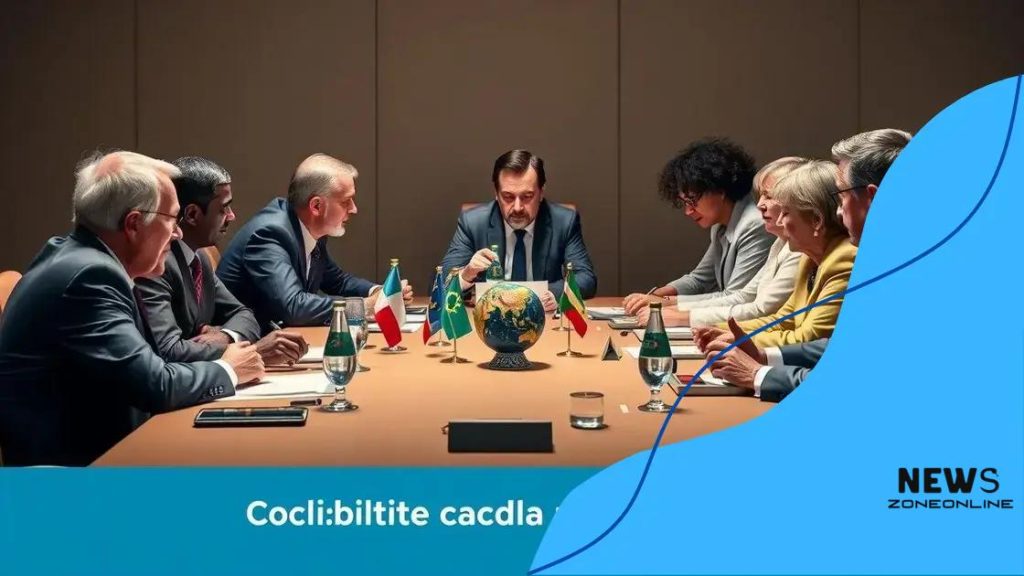Climate diplomacy: new international agreements shaping our future

Climate diplomacy refers to international efforts by nations to collaborate on addressing climate change through negotiations and agreements, aiming to promote sustainability and mitigate environmental impacts.
Climate diplomacy: new international agreements are redefining collaboration between countries. Have you ever wondered how these pacts influence environmental action and global policies? Let’s dive in and explore.
Understanding climate diplomacy
Understanding climate diplomacy is crucial in today’s interconnected world. It involves the negotiation and collaboration between nations to address climate change and its impacts. These discussions often lead to international agreements that aim to mitigate environmental issues.
The Importance of Climate Diplomacy
Climate diplomacy plays a pivotal role in shaping global environmental policies. Countries come together to share resources, knowledge, and strategies. This cooperative effort can significantly enhance the effectiveness of climate actions.
- Promotes shared goals
- Encourages accountability among nations
- Facilitates technology sharing
- Addresses global issues collectively
Moreover, climate diplomacy supports initiatives that can lead to sustainable development. For instance, nations may focus on reducing greenhouse gas emissions and transitioning to renewable energy sources. These collaborative strategies help combat the threats posed by climate change.
Key Actors in Climate Diplomacy
Various actors are involved in climate diplomacy, including governments, non-governmental organizations (NGOs), and international bodies. Each plays a unique role in the process:
- Governments establish policies and represent their nations in international forums.
- NGOs advocate for environmental protection and hold governments accountable.
- International bodies, like the United Nations, facilitate discussions and negotiations.
As conversations around climate diplomacy evolve, it’s essential that all voices are heard. Engaging diverse stakeholders can lead to more comprehensive solutions.
Ultimately, understanding climate diplomacy allows us to see how collaborative efforts can lead to a healthier planet. The complexities of these interactions highlight the importance of working together to address climate challenges effectively.
Key international agreements
Key international agreements are essential in the field of climate diplomacy. They provide a framework for countries to collaborate and commit to achieving common environmental goals. These agreements help nations take concrete actions against climate change and its consequences.
The Paris Agreement
The Paris Agreement, adopted in 2015, aims to limit global warming to well below 2 degrees Celsius. This landmark deal encourages nations to submit their action plans, known as Nationally Determined Contributions (NDCs). Each country’s commitment contributes to the overall goal of reducing greenhouse gas emissions.
- Sets a target to limit temperature rise
- Encourages regular reporting of progress
- Involves financial support for developing countries
- Promotes global transparency and accountability
Another important agreement is the Kyoto Protocol, which was initiated in 1997. It was the first binding agreement setting greenhouse gas emission reduction targets for developed nations. While it laid the groundwork for future negotiations, its effectiveness over time has been debated.
The Impact of International Collaborations
Collaborative agreements like the Paris Agreement foster a sense of unity among countries. They promote sharing of technology and resources to combat climate change. Through these pacts, nations can learn from each other and implement best practices in sustainability.
Moreover, these international agreements can lead to innovations in renewable energy and conservation efforts. By working together, countries can develop new strategies and solutions that might not be achievable independently.
As we move forward, the commitment shown through these agreements is crucial. Key international agreements continue to shape the landscape of climate diplomacy and guide global efforts toward a sustainable future.
The role of nations in climate cooperation

The role of nations in climate cooperation is crucial for addressing global environmental challenges. Countries work together to share responsibility for climate action. Each nation has unique capabilities and resources, which they bring to the table in international discussions.
Collaborative Efforts
Countries collaborate through various platforms and agreements. This cooperation can lead to innovative solutions and improved practices. By pooling resources and knowledge, nations can tackle climate change more effectively.
- Sharing technology for renewable energy
- Exchanging best practices for sustainable agriculture
- Coordinating disaster response
- Developing joint research initiatives
In addition to sharing resources, nations play a vital role in setting climate policies. National governments create strategies that align with international agreements. These policies guide local actions and encourage communities to engage in sustainability efforts.
The Impact of Global Partnerships
Climate cooperation enables nations to form strategic partnerships. These partnerships often address specific issues, such as deforestation, ocean conservation, or pollution reduction. When countries unite around common goals, they amplify their impact.
Moreover, countries can influence each other positively. For example, seeing a peer nation succeed in reducing emissions can inspire others to follow suit. This kind of peer pressure often drives nations to meet their climate targets.
The active participation of nations in climate cooperation is essential for fostering a united front against climate change. When governments commit to working together, it creates a global movement strong enough to initiate real change.
Challenges in global climate negotiations
Challenges in global climate negotiations are significant barriers to achieving meaningful progress. Different nations have varying priorities, and this often leads to conflicts in discussions. Understanding these challenges is essential for improving cooperation and finding common ground.
Diverse National Interests
Countries have distinct economic situations and environmental goals. For instance, developing nations may prioritize economic growth over stringent climate regulations. In contrast, developed nations might push for aggressive emission reductions. This disparity can complicate negotiations.
- Economic dependence on fossil fuels
- Varying capabilities for implementing changes
- Different levels of commitment to climate action
- Historical responsibilities for emissions
Moreover, negotiation processes can be slow and cumbersome. It can take years to reach agreements, and even then, commitments may not always be met. This slow pace can lead to frustration among advocates and policymakers alike.
Communication Barriers
Another challenge is the language and cultural differences that can impede dialogue. Effective communication is vital for understanding and collaboration. Misunderstandings may arise, causing conflicts or leading to delays in negotiations.
Furthermore, external factors such as political change within countries can affect commitment levels. When new leaders come into power, they might prioritize different issues, disrupting ongoing negotiations or initiating a complete change in approach.
Despite these challenges, nations are working to build more inclusive and effective frameworks for global climate negotiations. By promoting transparency and fostering trust, the international community can better address the problems that hinder progress.
Future prospects for climate diplomacy
The future prospects for climate diplomacy are both hopeful and challenging. As the global community becomes increasingly aware of the impacts of climate change, there is a growing momentum for action. Nations are recognizing the necessity of collaboration to tackle these critical issues.
Innovative Approaches
One trend shaping the future of climate diplomacy is the rise of innovative approaches to negotiations. Countries are exploring new strategies that include more flexible frameworks. This flexibility can lead to more effective agreements that are better suited to the unique needs of different nations.
- Promoting multi-stakeholder involvement
- Utilizing technology for data sharing
- Developing regional partnerships
- Encouraging grassroots movements
Another significant aspect is the increasing importance of public awareness and activism. Citizens are becoming more vocal about their concerns regarding climate change. This grassroots pressure can influence governments to take stronger stances in negotiations.
Strengthening Global Commitment
In order to strengthen commitments, future climate diplomacy efforts must focus on accountability. This could involve regular assessments of countries’ progress and establishing clearer consequences for failing to meet targets. Greater transparency can enhance trust among nations.
As climate impacts accelerate, the urgency for effective diplomacy grows. Countries may need to prioritize climate action in their foreign policies. This alignment can lead to stronger global partnerships that emphasize shared responsibility for the health of the planet.
Ultimately, the success of future climate diplomacy will depend on the willingness of nations to engage and collaborate. By acknowledging the interconnectedness of climate issues, the global community can work together toward a sustainable future.
Conclusion: The future of climate diplomacy is a journey filled with both challenges and opportunities. As nations recognize the urgency of climate change, they are finding new ways to collaborate effectively. Innovative approaches, increased public awareness, and a commitment to accountability are essential for creating a sustainable future. By working together, countries can overcome barriers and pioneer solutions that benefit the entire planet. The ongoing commitment to climate cooperation will be the cornerstone for future generations’ hope and prosperity.
FAQ – Frequently Asked Questions about Climate Diplomacy
What is climate diplomacy?
Climate diplomacy refers to the negotiations and collaborations between nations to address climate change and its impacts.
Why is public awareness important in climate diplomacy?
Public awareness drives grassroots movements that can influence governments to take stronger actions and commitments in climate negotiations.
What challenges do nations face in climate negotiations?
Nations face challenges like differing economic priorities, communication barriers, and varied commitment levels to climate action.
How can innovation improve climate diplomacy?
Innovation can introduce flexible negotiation frameworks and enable countries to implement new technologies and solutions for climate change.





